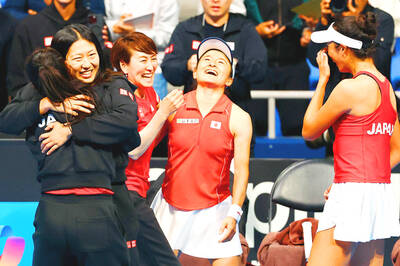Their Southern California itinerary is a 10-year-old boy’s dream: Disneyland, a Los Angeles Lakers game and a visit to Santa Monica Beach, yet most of the players from a basketball academy in the mountains of southern Mexico have not heard of Mickey Mouse. Having grown up in isolated villages, basketball is a ticket to a better life for them.
At home in Oaxaca, Mexico, the youngsters are so poor that they play without shoes, but they were all wearing sneakers on Friday as they got to slap hands with Lakers players. After winning an international tournament in Argentina, they have been dubbed the “barefoot giants of the mountains.”
“Despite having everything against them, these children have shown their strength on the basketball court and won,” said Gerardo Vasquez, president of a federation of Oaxacan immigrant groups in Southern California. “They’ve shown the world that despite their circumstances, they are a light of hope for Oaxacans and Mexicans.”
While many Mexicans are soccer fans, in the rugged hills of Oaxaca State there are more ball courts than soccer pitches. Some say that the modern game echoes the traditional ceremonial game of ulama, which was played to the death in stone courts that now stand in ruins.
At home in southern Mexico, the seven to 11-year-old team members live at a boarding school, study Spanish and their native language of Triqui, and attend daily three-hour-long basketball practices.
The 17 players come from some of Mexico’s poorest areas, where “it looks like they’re stuck in the 18th century,” said Sergio Zuniga, chief coach and founder of the Mexican Academy of Indigenous Basketball in Oaxaca.
“To see children who only have one meal a day, sharing a plate of beans and one tortilla between three people, isn’t rare,” he said.
Zuniga said his program uses basketball to teach discipline and pride, to help children graduate high school and perhaps even attend a university.
On their first US tour, the boys are playing teams from Los Angeles-area Catholic schools, recreation leagues and even an ad-hoc team of reporters from Spanish-language media. They arrived on Tuesday last week and will leave after Christmas
The children are usually shorter than their opponents. Zuniga and his team of coaches, teachers and social workers cannot do anything about their genes, and even the 11-year-olds look like they are ages away from a teenage growth spurt.
On Wednesday night last week, while Zuniga shouted from the sidelines in Spanish and Triqui, the boys played a scrappy game and kept the score tight against their taller rivals in the Woodland Hills area of Los Angeles to ultimately claim victory.
Team member Tobias de Jesus Bautista, 11, said he was undaunted by his opponents’ size.
“We have to give double, triple the effort, but I think we can compensate for our height by concentrating on our free-throws, by being in better physical condition and by being more sure of what we’re doing. We can reach our dreams,” Bautista said.

College basketballer Kaitlyn Chen has become the first female player of Taiwanese descent to be drafted by a WNBA team, after the Golden State Valkyries selected her in the third and final round of the league’s draft on Monday. Chen, a point guard who played her first three seasons in college for Princeton University, transferred to the University of Connecticut (UConn) for her final season, which culminated in a national championship earlier this month. While at Princeton, Chen was named the Ivy League tournament’s most outstanding player three times from 2022 to last year. Prior to the draft, ESPN described Chen as

College basketballer Kaitlyn Chen (陳凱玲) has become the first player of Taiwanese descent to be drafted by a WNBA team, after being selected by the Golden State Valkyries in the third and final round of the league's draft yesterday. Chen, a point guard who played her first three seasons in college for Princeton University, transferred to the University of Connecticut (UConn) for her final season, which culminated in a national championship on April 6. While at Princeton, Chen was named the Ivy League tournament's most outstanding player three times from 2022 to last year. Prior to the draft, ESPN described Chen as a

Japan yesterday secured a second consecutive Billie Jean King Cup finals appearance with a 2-1 win over 2023 champions Canada, thanks to Ena Shibahara and Shuko Aoyama’s 6-3, 5-7, 6-2 win over Kayla Cross and Rebecca Marino in the qualifying doubles decider. Shibahara and Aoyama powered through the opening set 6-3, breaking twice for a quick 3-0 lead. Cross and Marino hit back in the second, edging it 7-5 to level the match, before the Japanese pair regained control in the third. Canada’s 18-year-old Victoria Mboko edged Shibahara 6-4, 6-7 (8/10), 7-5 in a marathon opening clash. Mboko fired eight aces to

DAY OF BLOWOUTS: Elsewhere, the Lakers clinched the third seed in the Western Conference with a 140-109 pounding of the under-strength Houston Rockets The Denver Nuggets on Friday improved their playoff position, with a triple double from Nikola Jokic helping them to a 117-109 win over the Memphis Grizzlies. The Serbian put up 26 points, 13 assists and 16 rebounds. The triple-double performance, his 34th this season, ensured that he will finish the regular season as just the third NBA player to average a triple double across an entire season. The win meant the Nuggets improved to 49-32 on the season and gave them a real chance of grabbing fourth place and home-court advantage in the playoffs. Aaron Gordon top scored with 33 points for Denver,